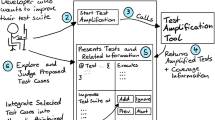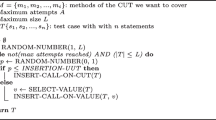Abstract
The development of precision grammars is an inherently resource-intensive process; their complexity means that changes made to one area of a grammar often introduce unexpected flow-on effects elsewhere in the grammar which may only be discovered after some time has been invested in updating numerous test suite items. In this paper, we present the browser-based gDelta tool, which aims to provide grammar engineers with more immediate feedback on the impact of changes made to a grammar by comparing parser output from two different grammar versions. We describe an attribute weighting algorithm for highlighting components of the grammar that have been strongly impacted by a modification to the grammar, as well as a technique for clustering test suite items whose parsability has changed, in order to locate related groups of effects. These two techniques are used to present the grammar engineer with different views on the grammar to inform them of different aspects of change in a data-driven manner.






Similar content being viewed by others
Notes
In the DELPH-IN grammar engineering formalism, rules and lexical entries can inherit constraints from multiple supertypes. This allows for commonly occurring constraints to be collected together, which is desirable both from the point of view of capturing linguistic abstractions and also avoiding repetition, but at the cost of increasing the chances of surprises.
Note that it is not possible to perform direct comparative evaluation of gDelta and Oceanography, as they have been developed to work with different grammar engineering frameworks (the DELPH-IN stack and XLE, respectively).
An interactive demo of the ERG can be found at http://erg.delph-in.net/logon, where rule identifiers can be viewed by hovering over nodes of parse trees from successfully parsed sentences.
Since it is not clear that this will always be the most useful means of presentation, we also made this a system parameter, which allowed for the selection of the signed version of the IDF function—rather than the unsigned default—to be used throughout gdelta.
References
Baldridge, J., Chatterjee, S., Palmer, A., & Wing, B. (2007). DotCCG and VisCCG: Wiki and programming paradigms for improved grammar engineering with OpenCCG. In Proceedings of the workshop on grammar engineering across frameworks (GEAF 2007). Manchester, UK.
Bender, E. M., Flickinger, D., Oepen, S., & Zhang, Y. (2011). Parser evaluation over local and non-local deep dependencies in a large corpus. In Proceedings of the 2011 conference on empirical methods in natural language processing (pp. 397–408). Edinburgh, UK.
Butt, M., King, T. H., Niño, M. E., & Segond, F. (1999). A grammar writer’s cookbook. Stanford, USA: CSLI Publications.
Butt, M., Dyvik, H., King, T. H., Masuichi, H., & Rohrer, C. (2002). The parallel grammar project. In Proceedings of the workshop on grammar engineering and evaluation at the 19th international conference on computational linguistics (COLING 2002) (pp. 1–7). Taipei, Taiwan.
Callmeier, U. (2002). PET—A platform for experimentation with efficient HPSG processing techniques. In S. Oepen, D. Flickinger, J. Tsujii, & H. Uszkoreit (Eds.), Collaborative language engineering. Stanford, USA: CSLI Publications.
Crabbé, B., Duchier, D., Gardent, C., Le Roux, J., & Parmentier, Y. (2013). XMG: eXtensible MetaGrammar. Computational Linguistics, 39(3), 591–629.
Crouch, D., Dalrymple, M., Kaplan, R. M., King, T. H., Maxwell, J., & Newman, P. (2014). XLE documentation. Palo Alto Research Center. http://www2.parc.com/isl/groups/nltt/xle/doc/xle_toc.html
Dalrymple, M. (2001). Lexical functional grammar. New York, USA: Academic Press.
de Kok, D., Ma, J., & van Noord, G. (2009). A generalized method for iterative error mining in parsing results. In Proceedings of the 2009 workshop on grammar engineering across frameworks (GEAF 2009) (pp. 71–79). Suntec, Singapore.
Dost, A., & King, T. H. (2009). Using large-scale parser output to guide grammar development. In Proceedings of the 2009 workshop on grammar engineering across frameworks (GEAF 2009) (pp. 63–70). Suntec, Singapore.
Flickinger, D. (2002). On building a more efficient grammar by exploiting types. In S. Oepen, D. Flickinger, J. Tsujii, & H. Uszkoreit (Eds.), Collaborative language engineering (pp. 1–17). Stanford: CSLI Publications.
Gardent, C., & Narayan, S. (2012). Error mining on dependency trees. In Proceedings of the 50th annual meeting of the association for computational linguistics (pp. 592–600). Jeju Island, Korea.
Goodman, M., & Bond, F. (2009). Using generation for grammar analysis and error detection. Proceedings of the ACL-IJCNLP 2009 conference short papers (pp. 109–112). Suntec, Singapore.
Guillaume, B., & Perrier, G. (2009). Interaction grammars. Research on Language and Computation, 7(2–4), 171–208.
Joshi, A. K., & Schabes, Y. (1997). Tree-adjoining grammars. In G. Rozenberg & A. Salomaa (Eds.), Handbook of formal languages (Vol. 3, pp. 69–124). Berlin, Germany: Springer.
Müller, S. (2013). The CoreGram project: A brief overview and motivation. In Proceedings of the workshop on high-level methodologies for grammar engineering (HMGE 2013) (pp. 93–104). Düsseldorf, Germany.
Oepen, S., & Carroll, J. (2000). Parser engineering and performance profiling. Natural Language Engineering, 6(1), 81–97.
Oepen, S., & Flickinger, D. P. (1998). Towards systematic grammar profiling test suite technology ten years after. Natural Language Engineering, Special Issue on Evaluation, 12, 411–436.
Oepen, S., Netter, K., & Klein, J. (1997). TSNLP—Test suites for natural language processing. In J. Nerbonne (Ed.), Linguistic databases (pp. 13–36). Stanford, USA: CSLI Publications.
Oepen, S., Toutanova, K., Shieber, S., Manning, C., Flickinger, D., & Brants, T. (2002). The LinGO Redwoods treebank. Motivation and preliminary applications. In Proceedings of the 19th international conference on computational linguistics (COLING 2002) (pp 1–5). Taipei, Taiwan.
Pollard, C., & Sag, I. A. (1994). Head-driven phrase structure grammar. Chicago, USA: University of Chicago Press.
Rousseeuw, P. J. (1987). Silhouettes: A graphical aid to the interpretation and validation of cluster analysis. Journal of Computational and Applied Mathematics, 20, 53–65.
Sagot, B., & de La Clergerie, E. (2006). Error mining in parsing results. In Proceedings of the 21st international conference on computational linguistics and 44th annual meeting of the association for computational linguistics (pp. 329–336). Sydney, Australia.
Siegel, M. (2000). HPSG analysis of Japanese. In W. Wahlster (Ed.), Verbmobil: Foundations of speech-to-speech translation (pp. 264–279). Berlin, Germany: Springer.
Steedman, M. (2000). The syntactic process. Cambridge, USA: MIT Press.
Tanaka, Y. (2001). Compilation of a multilingual parallel corpus. In Proceedings of PACLING 2001 (pp. 265–268). Kitakyushu, Japan.
van Noord, G. (2004). Error mining for wide-coverage grammar engineering. In Proceedings of the 42nd meeting of the association for computational linguistics (ACL 2004) (pp. 446–453). Barcelona, Spain.
Waterman, S. A. (2009). Distributed parse mining. In Proceedings of the workshop on software engineering, testing, and quality assurance for natural language processing (SETQA-NLP 2009) (pp. 56–64). Boulder, USA.
Ytrestøl, G., Flickinger, D., & Oepen, S. (2009). Extracting and annotating Wikipedia sub-domains—Towards a new escience community resource. In Proceedings of the seventh international workshop on treebanks and linguistic theory (pp. 185–197). Groningen, Netherlands.
Zhang, Y., Oepen, S., & Carroll, J. (2007). Efficiency in unification-based \(n\)-best parsing. In Proceedings of the 10th international conference on parsing technologies (pp. 48–59). Prague, Czech Republic.
Acknowledgments
We would like to thank Emily Bender, Francis Bond and Chikara Hashimoto for their insights into the grammar engineering development process that contributed towards the development of gDelta. We would especially like to thank Dan Flickinger, who additionally provided us with the modified versions of the ERG for use in the evaluation of gDelta. We would also like to thank the three anonymous reviewers, whose comments greatly improved this article.
Author information
Authors and Affiliations
Corresponding author
Rights and permissions
About this article
Cite this article
Letcher, N., Dridan, R. & Baldwin, T. gDelta: a missing link in the grammar engineering toolchain. Lang Resources & Evaluation 49, 51–75 (2015). https://doi.org/10.1007/s10579-014-9293-0
Published:
Issue Date:
DOI: https://doi.org/10.1007/s10579-014-9293-0




